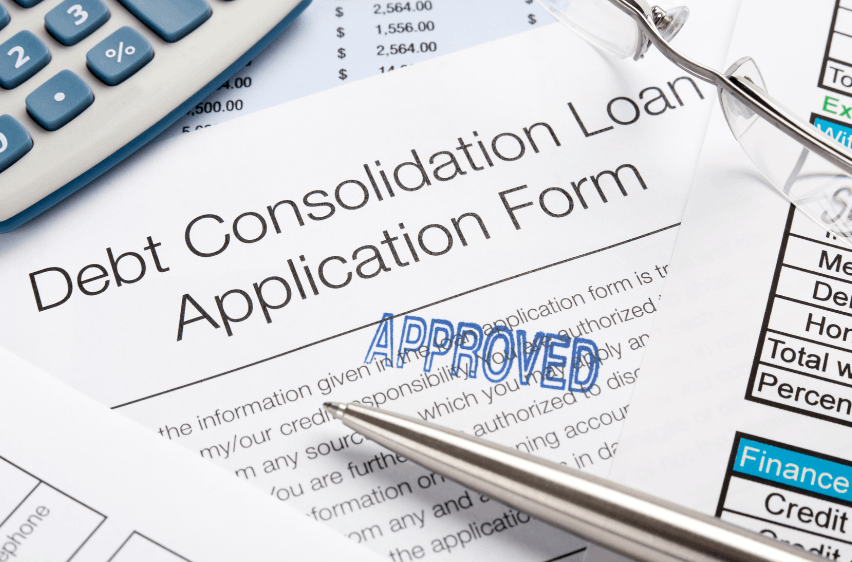Everyone has debt, but you can manage everything and put yourself on an excellent trajectory to loan reimbursement even if you found yourself as one of the 26% of Americans who juggle overpayments.
Debt consolidation loans are an option you should explore. You may use a credit or bank card to pay off several debts or lines of credit, which makes refinancing easier. While debt restructuring has many advantages, it still has some disadvantages.
Debt consolidation is dividing out new, lower-interest credit and using it to pay down old debts. It can be a perfect way to automate loans while lowering living expenses if your credit rating has risen since you took out your new loans, or even if you only have trouble making single loan repayments. Read on to learn more.
- Introduction To Debt Consolidation Loans
- Advantages Of Debt Consolidation Loans
- How To Get A Debt Consolidation Loan
- Secured Loans

Introduction To Debt Consolidation Loans
A debt consolidation loan is a method of refinancing, allowing you to pay off your debts quicker and more easily. Suppose you have several credit and debit cards with outstanding loans. You can take out a single loan to repay everything at once, leaving you with only one minimum payment.

The new loan usually has a lower payment than bank cards, making it much easier to repay. It essentially combines every one of these loans into a single loan with a single monthly charge. Consolidating loans refers to the process of putting several debts together and merging them into a single loan.
When you think about it, combining loans is logically impractical. The rate of interest and maturity provisions for each loan is different. To merge or reconcile bonds, you must first obtain a new, larger loan, which you will use to repay all of the smaller loans you wish to merge.
Banks, credit unions, and insurance firms provide debt consolidation loans. Several debt relief plans combine all debt contributions under one account for those experiencing difficulties paying several bills.
How Debt Consolidation Loans Work
You will apply for a new loan which you will use to pay off your other debt. All outstanding amounts on the current loans need to be settled before the loans will be closed. The first step in the debt consolidation process is to apply for debt consolidation credit from your mortgage, community bank, or bank account provider.
It’s a good starting point, particularly when you have a strong relationship with the organization and a track record of timely payments. If these institutions reject you, try to apply to private home mortgages or corporations. It also enables you to merge all of your debt balances into a single loan with just one charge, rather than paying each one separately.
However, you must note that your credit report plays a role in obtaining a good credit rating. If your credit rating has improved since you first registered for credit cards, you will get a better deal than what you’re used to.
Advantages Of Debt Consolidation Loans
Debt consolidation loans, as previously said, are one of the most effective methods to get you out of debt. It will help you get closer to overall debt repayment, particularly if you have a lot of consumer debt.

There is no fixed deadline for paying off the balance owed. This refinancing form will also make budgeting easier and reduce the chances of nonpayment. You shouldn’t be concerned with interest because debt restructuring loans have a lower interest rate, normally about 11.88 percent.
The balance and interest rate will also remain the same for the loan duration if you have a set repayment schedule; there will be no unpredictable fluctuations in your monthly mortgage payment.
Debt consolidation loans will help you boost your credit rating in the long run, specifically if you maintain on-time repayment. The credit profile is perhaps the most critical consideration in determining your credit rating.
Disadvantages Of Debt Consolidation Loans
Although debt consolidation may seem to be a smart idea, it is not without its disadvantages. Restructuring loans will assist with debt repayment, but it would not erase the situation that led you to trouble in the first place, such as reckless spending or forgetting to put aside funds for unexpected expenses.
By paving the way to better manage your finances, you will avoid adding more loans to your name. When exploring debt consolidation options, it’s still a good idea to do your research.
You must also scan the terms and conditions to ensure that you completely comprehend the loan’s costs. Consolidation often does not result in a lower interest rate on your mortgage, specifically if you have a low credit score.
How To Get A Debt Consolidation Loan
Almost everyone in financial trouble will benefit from consolidating monthly charges into a single source. But be cautious. It only succeeds if the debt consolidation loan lowers the monthly payments while still lowering the borrowing costs on your loans.

As a result, it’s crucial to be well-organized and keep accurate financial statements. To have a debt restructuring loan, you should do a bunch of tasks. First, you must make a list of the debts you want to merge, noting the sum, deadline, and interest payment.
Add the recurring contributions you make on each loan to draw a comparison. Your current total repayment and interest rate must be less than what you’re paying now. If it isn’t, you will work with the creditor to reduce all costs. Community banks typically prefer consumers that seek to lower their costs.
Is Debt Consolidation Loans Good Or Bad For You?
If debt consolidation is beneficial or detrimental to your financial position, speaking with a professional credit manager who can provide impartial guidance is beneficial.
The disadvantage of debt consolidation is that it can deceive you and foster bad financial practices. You often feel great about yourself and your assets after consolidating your debts. This monthly contribution is frequently cheaper than your former installments, but you now have more financial space and a bit more money to spare.
The issue is that you needed debt consolidation loans because you’ve been overspending. You make your financial position worst by trying to invest more than you earn rather than noticing you’ve been spending too much money and should perhaps devise a solution to get back on the right track.
Secured Loan
Secured loans are debt consolidation loans with equity that can be liquidated if the creditor fails to make payments. A high-value asset, such as a real estate property or vehicle, is often used as collateral for a secured loan, so you can normally apply for a greater loan amount.

Few people would be able to buy any properties in America if it weren’t for mortgage loans. It’s clear that risking your property or vehicle is undesirable, but it’s also the only solution to remove paying high fees.
In comparison to unsecured loans, secured loans typically have lower fees and longer maturity terms. You can borrow against your home loan with a lender, second mortgage, or cash-out refinance if you have any valuables. You should choose this option if you have a reliable income and a good chance of repaying your debts.
Mortgages, auto loans, and secured credit cards are examples of secured loans. There are also severe consequences of deferring on a secure loan. If the liquidated collateral property does not trade for the total sum owing on the insured debt, the seller has the right to claim restitution from you on the prorated refund.
How Secured Loans Works
Large-ticket goods can be made more accessible with secured loans. But more, creditors want these loans to recover the object being borrowed if the debt is defaulted on. Security reduces the lender’s burden and tends to keep inflation down.
Home loans are typically thought of as healthy credit. Borrowers will likely ask a lot of questions about you and the worth of the property you’re purchasing for two main reasons: creditors would like to understand if you’ll be able to finance a huge loan in 10 years, and if you wouldn’t be able to, they will take your property and sell it to offset the loan.
Since the worth of the debt depreciates with time, auto loans have higher interest rates than mortgage loans. A creditor may seize the equity, but it may not be sufficient to fund the debt. A higher interest rate reduces the likelihood of this occurring.
Takeaway
Whether or not you can take out a debt relief loan is primarily determined by various factors, including your financial aspirations, credit score, and whether or not you stick to a schedule. Please don’t get into the pit of restructuring credit as a coping mechanism to make it better for the time being to get you by.
Keep in mind that debt consolidation loans will help as a sign of long-term financial management issues. Consolidation loans may be beneficial, but they aren’t the end-all remedy.
Remarque : La demande et l’utilisation d’un prêt comportent des risques. Pour plus d’informations, veuillez vous reporter à la page des conditions générales de la banque.